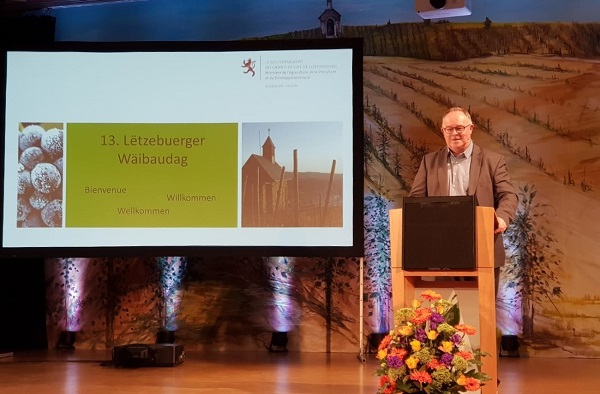 Romain Schneider, Luxembourg's Minister of Agriculture, Viticulture and Rural Development;
Credit: MA
Romain Schneider, Luxembourg's Minister of Agriculture, Viticulture and Rural Development;
Credit: MA
The 13th edition of the Luxembourg Viticulture Day, organised by the Luxembourg winegrowers' association (Luxemburger Winzerverband) and the Wine Institute (Institut viti-vinicole - IVV), took place on Wednesday 3 February 2021 in the form of a webinar and in the presence of Luxembourg's Minister of Agriculture, Viticulture and Rural Development, Romain Schneider.
The programme revolved around the topical issues of digitalisation and the effects of the COVID-19 pandemic on viticulture. Marc Weyer, President of the Luxembourg winegrowers' association, kicked off the event.
In his address, Viticulture Minister Romain Schneider addressed the effects of the pandemic on the viticulture sector in various forms. He addressed the issue of cross-border harvest workers, which had worried many winemakers during their autumn planning. To enable the harvest workers to enter, the IVV and Luxembourg's health department issued over 1,000 vouchers last autumn to allow harvest workers to get tested for COVID-19 free of charge upon entering the Grand Duchy.
The efficiency of this measure meant that an additional offer of help had to be used less than expected: the IVV, the Maschinenring and the ADEM employment agency worked together to refer people living in Luxembourg to the farms whose harvest workers from abroad faced pandemic-related problems regarding arrival and departure. A total of 21 out of over 400 potential helpers were placed in such farms.
The sector was also given financial assistance. Lëtzebuerger Wäin supported promotion costs with an additional €350,000 and further contributions were made to the viticulture solidarity fund (Fonds de solidarité viticole).
Minister Romain Schneider emphasised the need for these support measures based on falling wine sales figures from 2019/20, which already showed the impact of the pandemic. While one could assume relatively stable wine and crémant sales of 6.3 million litres in recent years, sales in the 2019/20 wine year amounted to only 5.3 million litres and consumption per capita dropped by two litres. The main reason for this is attributed to closed restaurants as well as the cancellation of many public and private events due to the health crisis.
Nevertheless, exports recorded a slight increase of 3% in 2019/20.
In addition to the development of the European Union's (EU) common agricultural policy (CAP), the 13th Luxembourg Viticulture Day also focussed on digitalisation.
Luxembourg's Minister of Viticulture recalled that companies requesting subsidies will only be able to submit the viticulture mapping survey digitally from this year on. There is no change for any of the other businesses and the Wine Institute is available to answer any questions.
The "Appellation d'Origine Protégée – Moselle Luxembourgeoise" (AOP) is also repositioning itself in terms of digitalisation. From the 2021 harvest onwards, consumers should be able to view a product passport for the wine using a QR code on the AOP label. This is aimed at contributing to the transparency of the product and allowing consumers to follow its path from the vine to their glass.
International scientists and national experts then discussed wine-growing topics, such as the irrigation of young plants and funding programmes.
The business management organisers explained the effects of COVID-19 on wine sales, before presenting the LEADER projects "Wine sales in the Greater Region" and "Via Mosel" in the area of wine sales and tourism.
The traditional wine tasting did not take place this year due to sanitary restrictions.








